
“Defend the White Race”: American Extremists Being Co-Opted by Ukraine’s Far-Right
Bellingcat.com – Newly uncovered evidence going back to 2015 suggests that the Ukrainian white nationalist Azov movement has been systematically co-opting American right-wing extremists to advance the former’s own international agenda. In audio statements uncovered by Bellingcat, this agenda was summarized by the International Secretary of the political wing of Azov, the National Corps, as “world conservative revolution,” aimed to “defend the white race.” These new findings are separate from the recently reported ties between Azov and American violent neo-Nazi group the Rise Above Movement, and members of the American alt-right.
Summary of Findings
Bellingcat has confirmed that in January 2016, Azov, via its online podcast, was in contact with the late Andrew Oneschuk, an imminent member of the violent American neo-Nazi organization Atomwaffen Division. On Azov’s podcast, Oneschuk discussed issues facing Americans that wanted to join Azov and expressed interest in learning methods of attracting youth to nationalism in America. He was encouraged to try to join Azov.
In another previously unreported case from the autumn of 2018, the political wing of Azov, the National Corps, supported an effort by Joachim Furholm, a Norwegian citizen and self-described “national socialist revolutionary,” to bring American right-wingers to Ukraine to fight against Russian aggression. The effort specifically framed participation in Ukraine’s war against Russian aggression as an opportunity for American right-wingers to acquire combat and other practical experience to be deployed later within the United States after returning home. Furholm also spoke at a political rally held by the National Corps in front of Ukraine’s Parliament in September 2018.
Evidence uncovered by Bellingcat points to recent contacts between the National Corps and alleged former U.S. armed services members who are currently in Ukraine. In one instance, an alleged U.S. Army veteran named “Alex” made an appearance on an American white nationalist podcast to comment on the ease of joining the war in Ukraine. Also, an alleged U.S. Navy veteran, “Shawn Irwood,” is currently enlisted in the Armed Forces of Ukraine and maintains contact with the National Corps. Shawn had stated his intention to join the Azov Regiment online and was linked to the aforementioned Joachim Furholm prior to arrival in Ukraine in early 2018.
The International Secretary of the National Corps, responsible for Azov’s global strategy, told Bellingcat that the movement sought “all potential sympathizers” and “potential lobbyists” in the U.S., and hoped to “establish contacts with the American military.”
In late 2017, the U.S.-based American ally of the Azov movement, Counter-Currents Publishing — described by the Southern Poverty Law Center as an “epicenter of ‘academic’ white nationalism” — published statements from an Azov figure, Denis Nikitin, that urged Westerners to counter “violent immigrants who team up to beat defenseless whites, especially in Western Europe.” Nikitin reportedly urged his audience “to carry weapons of self-defense and not be too law-abiding.”
Newly uncovered statements by a senior law-enforcement official in Ukraine, former Azov fighter and deputy head of Kyiv region police Serhiy Bondarenko, suggest that incorporation of the Azov Regiment into the National Guard of Ukraine didn’t affect the far-right ideology espoused by the former’s members — and instead allowed Azov to obtain sophisticated weaponry and build their own political party. In 2015, Bondarenko admitted he was a veteran far-right operative, and stated his confidence that “all members of Azov have permanent ideological views that won’t change.” He also listed the current deputy-minister of Internal Affairs of Ukraine, Azov veteran Vadym Troyan, as an example of a Ukrainian law enforcement official loyal to Azov.
Background: The FBI on Azov’s Efforts to Train American Extremists
In October 2018, an FBI criminal complaint unsealed in connection with the arrest of members of the violent neo-Nazi group Rise Above Movement (RAM) pointed to said group’s contacts in Ukraine. Members of RAM who were charged in the U.S. in connection with violence at political rallies, including in Charlottesville, traveled to Ukraine in 2018 to meet key figures of the Azov movement.
Per the complaint, members of the Azov Regiment (the military branch of the larger Azov movement) “have participated in training and radicalizing United States-based white supremacy organizations.” The complaint did not provide any corroboration to this claim. In response to the allegation, Olena Semenyaka, the international secretary of the National Corps mentioned in the complaint, dared U.S. law enforcement to “provide real evidence.” At the same, Semenyaka acknowledged contacts with the American white supremacist group and said that RAM members came to Ukraine “to learn our ways” and that they “showed interest in learning how to create youth forces in the ways Azov has.”
Azov’s U.S. Contact Was Member of “Terroristic National Socialist Organization”
Bellingcat has established that RAM members were not the only American extremists who communicated with Azov in order to boost the far-right effort in the United States.
In January 2016, the Azov movement’s podcast introduced listeners to Andrew, a “national socialist” guest from the U.S. Dialing in via Skype, Andrew answered questions about nationalism in the U.S. from the host and listeners and asked his own about Azov.
“I get a lot of questions from American nationalists asking if there’s going to be a future for more foreign volunteers in Azov, or just in the Ukrainian military in general”, Andrew said (00:27:20 into the interview).
The Azov podcast that hosted Andrew was apparently launched in May 2014 under the name Radio Azov FM, meant to be a niche medium catering to a target audience of nationalists both in Ukraine and abroad. Various statements made by prominent Azov figures to the podcast appear to contradict Azov’s public statements regarding the movement’s ideology, political goals, and so on.
Over the years, the podcast featured interviews with far-right figures from Ukraine, Russia, Greece, Slovakia, Sweden, Canada and the U.S. The podcast and its formal head, Mikhail Oreshnikov, who is reportedly a Russian neo-Nazi (he relocated to Ukraine from Russia in 2014), were mentioned on the official site of the Azov Regiment’s Press Service. Radio Azov FM was rebranded into A-Radio in November 2015, apparently to work around blocking mechanisms on Russia’s VK.com social network. New shows are currently uploaded to VK.com and feature, for example, the National Corps’ official ideologue and spokesman Eduard Yurchenko.
We now know that the American interviewed on Azov’s podcast in early 2016 was Andrew Oneschuk, an imminent member of the Atomwaffen Division. The Atomwaffen Division is a “terroristic national socialist organization” (per SPLC) linked to multiple murders in the United States. Andrew, who was 16 at the time of his appearance on Azov’s podcast, went on to join AWD several months later in 2016. He, along with another AWD member, was murdered in May 2017 in Tampa, Florida by Devon Arthurs, also a member of AWD. Law enforcement reportedly found explosive materials in the apartment the three shared.
Oneschuk’s alleged murderer reportedly told detectives the men he killed planned to blow up power lines near a major highway.
This podcast recording has not been previously reported on, and Oneschuk’s family has confirmed to Bellingcat that this is his voice on the recording.
According to a Rolling Stone report, Oneschuk attempted to travel to Ukraine to join Azov in early 2015 but was thwarted when his family intervened. “I’ve been following Azov and Ukrainian nationalism since the beginning of Maidan [the revolution in Ukraine that ousted corrupt pro-Russian president Viktor Yanukovych],” he said at one point during the interview with Azov’s podcast.
Azov could count on support in the U.S., according to Oneschuk, “as long as there’s a larger media presence letting people know that Azov is friendly with all fraternal nations.” Oneschuk’s interest was apparently reciprocated. The podcast host assured Oneschuk that Azov was a “true nationalist.”
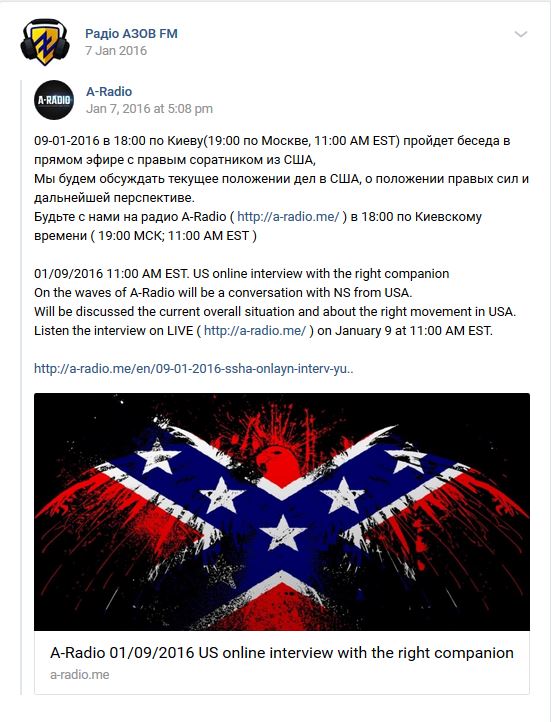
A screenshot of “Radio Azov FM”/ “A-Radio” VK.com post announcing an interview with “NS from the USA” who as we now know was Andrew Oneschuk, an imminent member of a violent American neo-Nazi group Atomwaffen Division
“The ideologies are quite clear. They’re against Zionism, against neo-Bolsheviks, and against the way everything works right now,” the host told Oneschuk.
During the interview, Oneschuk, and other Americans, were encouraged by the host to try to join Azov, when Oneschuk mentioned that some Americans had been snubbed online by members of the Azov whom they approached regarding joining the organization in Ukraine.
“On social media, many people have tried to contact members of the Regiment, but most of them have been turned away for not living in a European country,” Oneschuk said.
“You can try again if you want,” the host responded, “It was just the beginning when they tried, and [Azov] wasn’t very keen on accepting foreign volunteers, but the Ukrainian government passed a law that allows foreign volunteers to fight for the Ukrainian side. I think now it’s a bit easier”
American nationalists were also eager to learn from their European counterparts, according to Andrew, who told the host that a lot of Americans wanted to have “professional nationalist organizations like those coming up in Europe.”
“Finding ways to get young people into the movement would be helpful. Any examples from Europe would be welcome currently,” Andrew said at one point (00:31:00 into the interview).
Oneschuk and his host also attacked what they described as the “degeneracy” of the United States under then-president Barack Obama.
This interview provides a window into Azov’s early ties to the most extreme elements of the American far-right and the latter’s interest in Azov. These ties would continue to develop after the interview and into the present day.
National Socialist Recruiter Promotes Azov’s Political Wing in the U.S.
Azov’s interest in reaching American extremists and the Ukrainian group’s comfort in cooperating with neo-Nazis in the U.S. and West was on display again in 2018.
In the fall of 2018, in a development that has not been reported on, the National Corps provided support to and made steps to increase the public profile of Joachim Furholm, a Norwegian citizen and self-described “national socialist revolutionary.” Later that year, Furholm appeared on the American white nationalist Radio Wehrwolf, where he stated that the National Corps could assist American right-wingers who wanted to join Ukraine’s war against Russian aggression. Furholm was also provided by the National Corps with housing near Kyiv, where his foreign recruits were supposed to arrive.
Referred on-air as “Jarl” (his online monikers used across different platforms include “Jarl Wuterich”), Furholm, in a series of two interviews on October 8th and 22nd, framed participation in the war in Ukraine as a means for American right-wingers to acquire combat experience and contacts on the Ukrainian far-right scene, both of which, he thought, could be useful upon return to the United States. Furthermore, Furholm was housed by the National Corps during the interviews.
“I came to lead a small group of volunteers from all over the West, gain some military experience and hopefully be able to send some of these guys back home to pass on their skills and their knowledge,” (00:05:20 into the interview) Furholm told listeners about his mission in Ukraine.
“If they wanna get involved, I recommend they contact the National Corps”(00:49:50 into the interview).
Furholm also added that the National Corps was the group he “worked the closest with” in Ukraine (00:28:00 into the interview). He assured his American listeners that Ukraine was “the best bet we have at the moment” for white-nationalists to come to power, citing its “perfect mix of the bad economy, wartime situation, corrupt elite and media that no one trusts.”
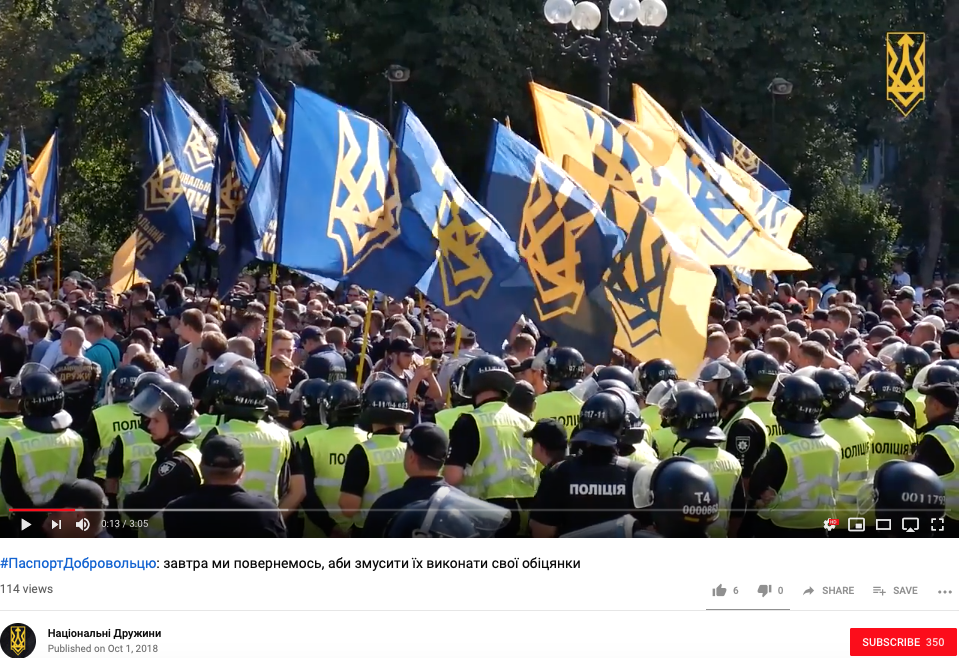
A still from the National Militia’s YouTube report on their and the National Corps September 20th, 2018 rally pushing for a path to citizenship for foreign fighters in Ukraine’s war against Russian aggression. Norwegian Joachim Furholm spoke at the rally and the National Corps’ invitation
“It’s like a Petri dish for fascism. It’s the perfect conditions,” Furholm stated (00:52:50 into the interview), “And they do have serious intentions of helping the rest of Europe in retaking our rightful lands.”
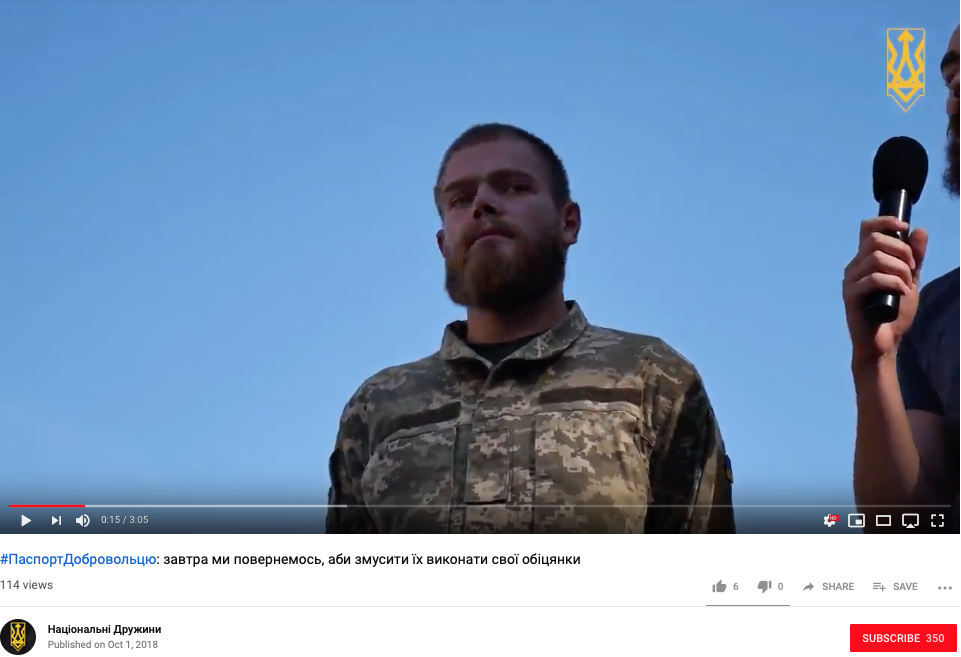
A still from the National Militia’s YouTube report on their and the National Corps September 20th, 2018 rally. Joachim Furholm is addressing the crowd via interpreter
While on-air, Furholm also encouraged listeners to get in touch with him via his Instagram page, where, as Bellingcat learned, he engaged users in North America. For example, in September, Furholm encouraged a young man in New Mexico to join him in Ukraine.
“Get over here laddie, there’s a rifle and a beer waiting for you,” Furholm wrote to an Instagram user, whose profile revealed both his identity and apparent extremist views. Videos and photos posted by said young American man showed that he had access to an arsenal of firearms, including a photograph taken from inside of a vehicle showing a handgun pointed towards the road intersection with the caption “Minorities when???” Another photograph had the caption “The Jew fears the Hunter” and showed the account’s apparent operator with a hunting rifle.
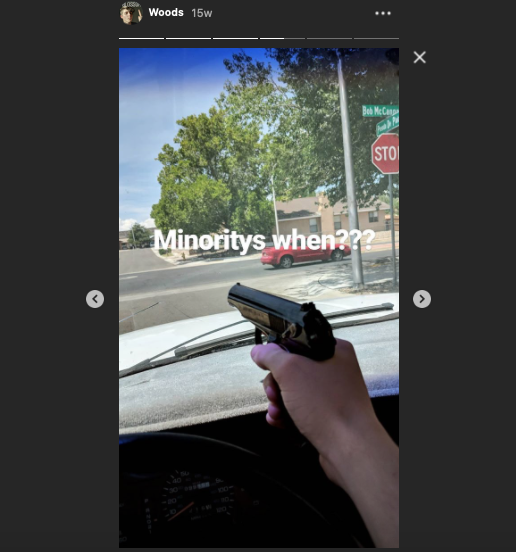
Screenshot from an Instagram story posted by a likely New Mexico resident, going by “_rahker_” whom Joachim Furholm invited to join him in Ukraine
An example of Azov’s pull with young American extremists can be observed with regard to the host of Radio Wehrwolf, the man who interviewed Furholm. The host uses the online persona of Blake Lucca online (their real name is likely Blake Luccasson) and can be seen in videos with a banner of “Misanthropic Division” behind him. This group is a neo-Nazi organization reportedly linked to Azov.
Luccasson’s online presence demonstrates his ongoing fascination with Azov, and suggests he’s been in touch with elements of Azov for some time. For example, Luccasson’s now-deleted Facebook account was connected to the International Secretary of the National Corps, Olena Semenyaka.
In November 2017 Luccasson tweeted “Hail Azov hail Ukraine hail Europeans” reacting to a news report related to the Azov Regiment. Also in November 2017, he mentioned he wrote that he had “talked to old Azov guys” in a tweet. In another tweet from the same period, Luccasson referred to Azov as being on “our side” and suggested white nationalists trained with Azov. Luccasson also tagged Azov news page on Twitter when he posted interviews he did with Joachim Furholm in October 2018.
The Radio Wehrwolf interview was not Furholm’s first public appearance as an Azov supporter. The party’s International outreach wing did its own video interview with the Norwegian in late August 2018, in which his unspecified contribution to the “common cause” received praise.
The party also had Furholm speak at the National Corps’ September 20th political rally in front of Ukraine’s Parliament (the Rada), where protesters were pushing for changes in Ukrainian law to benefit foreign pro-Ukrainian fighters facing possible extradition to their home countries. In the video report from the rally prepared by Azov’s street wing the National Militia, Furholm can be briefly seen addressing the crowd. Furholm was also interviewed at the event by the Ukrainian service of the U.S.-funded RFE/RL.
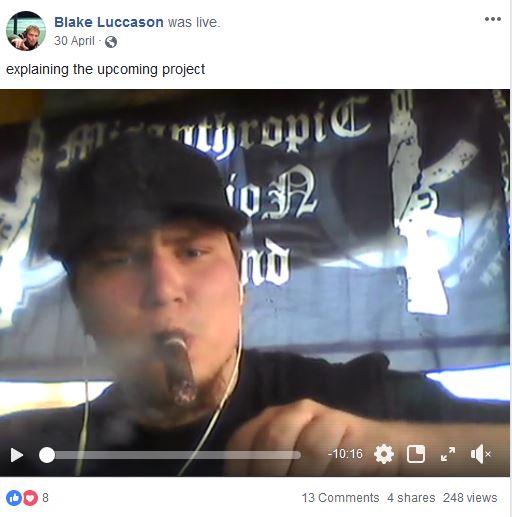
Screenshot: Radio Wehrwolf host Black Luccasson with a “Misanthropic Division” banner behind him
The Norwegian fit into this particular initiative from Azov because Furholm himself was able to pass mandatory vetting and join the Armed Forces of Ukraine — though he was discharged within weeks in the summer of 2018. This discharge reportedly occurred following direct action from the Ukrainian Ministry of Foreign Affairs, with no precise explanation given to the media, as reported by internet television station Hromadske. In Ukraine, it was speculated that Norwegian officials may have been behind the pressure to discharge Furholm.
At the same time that the National Corps paraded Furholm at their September rally, the story of his discharge made the rounds among Ukrainian media outlets, including a report in English that depicted him sympathetically. These reports failed to shed light on Furholm’s ideology of white supremacy or his ties to the Ukrainian far-right.
Furholm’s activities, in as far as they were aided by Azov’s political wing, were meant to go beyond just online outreach and public speeches. The National Corps apparently provided him with housing and training facilities for foreign volunteers he attempted to recruit to Ukraine. The facilities were filmed in a newly-released documentary, “Robin Hood Complex Ukraine — Europe’s Forgotten War,” created by British filmmaker Emile Ghessen, who spent months in Ukraine filming foreign volunteers, including Furholm.
The documentary features footage of an interview with the Norwegian filmed in, according to Ghessen, “an abandoned holiday park on the outskirts of Kyiv owned by the National Corps.” The exterior shots of the area showed a National Corps flag flying in front of what appears to be a wooden cottage. The name of the location is Smerekova Hunta, which is a facility located close to Kyiv, and, per online reports, used occasionally for far-right events.
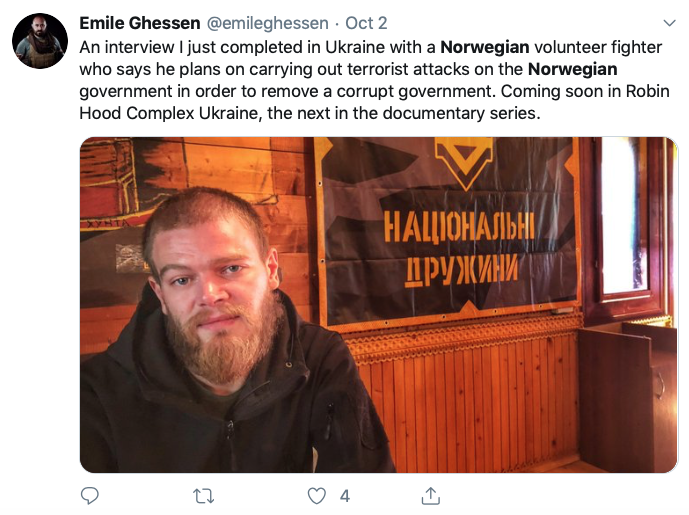
A tweet by documentary filmmaker Emile Ghessen about his interview with Joachim Furholm took place at the facility provided to Furholm by the National Corps. On the right is a banner of the National Militia, the street branch of the Azov movement
In interviews with Ghessen, Furholm echoed his intention to recruit foreigners to Ukraine, and in one instance agreed that “terrorist facilitator” was an apt descriptor of his activities there. According to the documentary, Furholm had no prior military experience before coming to Ukraine.
“This is the grounds we have been borrowed by the people we’re working with. This is supposed to be a training facility, and a housing facility for the people who come here to fight for Ukraine,” Furholm told Ghessen, adding that once he’s done with what was expected of him by his hosts, he will proceed to direct action aimed at the West, including attacks on the government of Norway. “I’d target the government with anything necessary (…) any means necessary”.
Ghessen told Bellingcat that he felt that Furholm was exploited by the National Corps “for the fact he was Norwegian and the fact there are many national socialists among the National Corps.” He also noted that the “National Corps know what he’s up to and many within the organization support his radical views.”
As of December 2018, Furholm was no longer in Ukraine and apparently split with the National Corps prior to leaving the country.
Are U.S. Military Veterans Being Targeted By Azov?
Although it is not clear how successful he was in putting American right-wingers in touch with Azov’s political wing, two Americans linked to Furholm have recently made contact with the National Corps in Ukraine.
One of these two Americans was enlisted in the Ukrainian Armed Forces as of December 2018. Known by his first name Shawn and his call-sign, “Texas,” this individual was profiled by Ukraine’s Joint Forces Operations (current title of Ukraine’s military operation against Russian aggression that was previously known as the Anti-Terrorist Operation) in November 2018, as an American volunteer fighting on Ukraine’s frontlines. Per the JFO, Shawn is an American citizen and spent years in the U.S. Navy where he served in the Persian Gulf and on the Korean peninsula and was interested in acquiring Ukrainian citizenship.
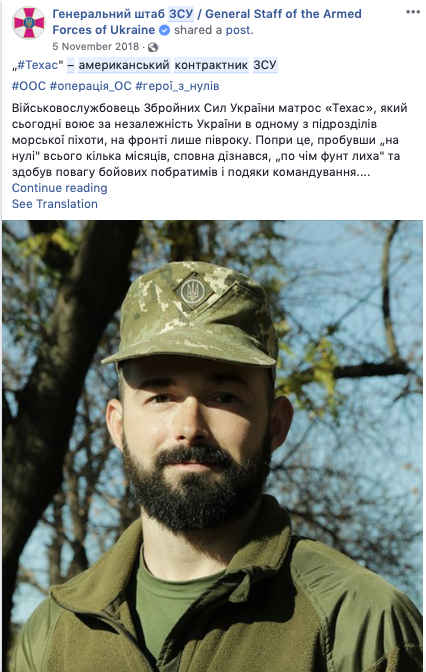
Screenshot of a Facebook post by the General Staff of the Armed Forces of Ukraine about “Shawn”
Bellingcat discovered several public social media exchanges between “Shawn” and National Corps figures in which he expressed interest in joining the Azov regiment, and revealed he knew Furholm personally.
Shawn may have crossed paths with Furholm in Ukraine in the spring of 2018 prior to joining the Armed Forces of Ukraine. He told Bellingcat that he had known Furholm prior to coming to Ukraine from “Facebook, gaming, and pagan groups,” and “had no issue” with Furholm’s ideology. He did not specify to what extent, if any, his communication with Furholm factored into his decision to come to Ukraine.
Shawn’s social media presence and his connections in Ukraine suggest he is interested in the local ultra-nationalist scene, as well as far-right ideology. His Facebook profile features images with a symbol associated with Nazism that references the Wehrwolf plan (the namesake of Radio Wehrwolf) to resist Allied forces in Europe.
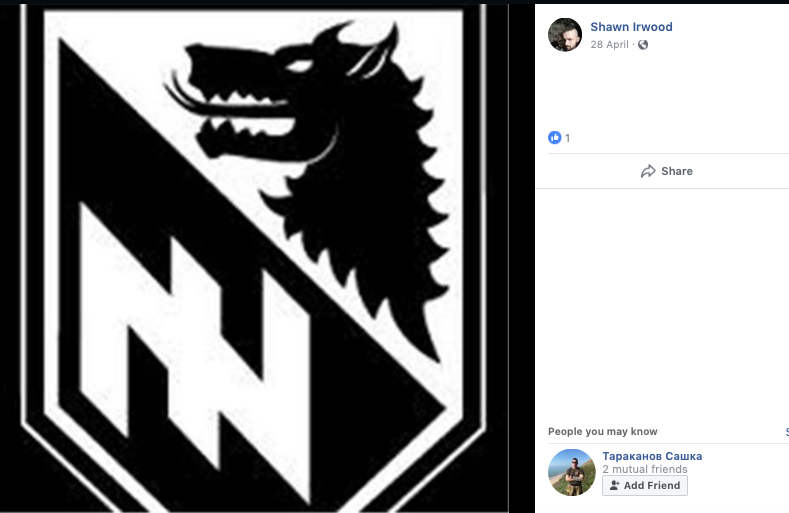
Screenshot of an image posted by “Shawn Irwood” on Facebook
Shawn told Bellingcat that he liked “SS aesthetics,” considered himself “more right-wing than left-wing,” and used multiple names “to protect his family.”
Another American close to Furholm, a self-described former U.S. Army soldier named “Alex”, was present during Furholm’s appearances on Radio Wehrwolf. During a broadcast with Furholm, Alex described how he allegedly joined a far-right militia in Ukraine:
“I was in the U.S. Army getting deployed. I was bored afterward. A guy hit me up on an anonymous account, a guy I’ve never met before, and was like ‘Hey welcome to join my sketchy ultra-nationalist militia in a foreign country. I said ‘Sign me the fuck up’. Three weeks later I was in trading shots with separatists in the fucking Shyrokyne.”
Shyrokyne is a village on the frontline of the war in eastern Ukraine, and notably, a location where far-right Ukrainian militias have been especially active.
Alex can be seen in multiple pictures with Furholm in Ukraine, including some taken during Furholm’s participation in the National Corps rally. Alex, who asked to be identified only by his first name, told Bellingcat that he was a former U.S. service member and had fought with the far-right Right Sector militia in Ukraine. These claims could not be fully corroborated, although various sources claimed that Alex arrived in Ukraine in 2017 and was known in some nationalist circles in Kyiv.
“I won’t pretend to be perfectly egalitarian,” Alex said of what he addressed as “race politics.”
Alex said both himself and the Norwegian expected that the National Corps would help them return to Ukraine’s frontlines, but left when it became clear the organization could not deliver.
According to Alex, some in the National Corps leadership were keen to use Furholm in their domestic outreach as “a local media presence,” and were aware of the interviews with Radio Wehrwolf, but “did not facilitate [the interviews] nor provide any input.”
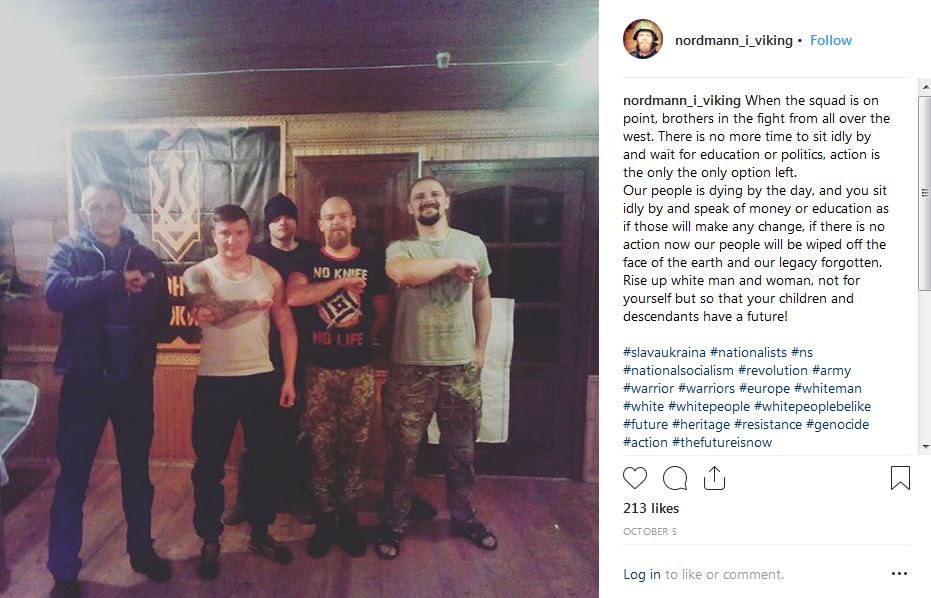
Screenshot of an Instagram post by Furholm. The photo was taken at the facility provided to Furholm by the National Corps. “Alex” is at the center of the group, wearing a hat
Reflecting Furholm’s ties to the National Corps, he answered our requests only after a specific request from Olena Semenyaka, the International Secretary of the National Corps.
In comments to Bellingcat, Furholm downplayed his ties to the National Corps, and sought to cast his extremist statements for Radio Wehrwolf as “locker room talk.”
“There has never been any direct work in regards to recruiting people or anything like that, or anything indirect either,” Furholm told Bellingcat, contradicting his on-air claims.
Azov Figure Admits Norwegian National Socialist Helped With International Outreach
Furholm’s efforts were praised by the National Corps’ International Secretary Olena Semenyaka, who confirmed to Bellingcat that the party housed him, and invited to speak at their rally. Semenyaka said she planned on recommending Furholm for membership in the Azov regiment, but abandoned the effort due to the “uncertainty of his legal status.”
In a series of exchanges with Bellingcat via Facebook, Semenyaka gave seemingly conflicting characterizations regarding the nature of her organization’s contacts with Furholm, and where they fit with Azov’s international outreach, specifically their courting of Americans to join their movement.
In some of her statements, Semenyaka claimed that the National Corps’ contacts with Furholm were limited, while in others suggested that Furholm’s activities were seen as potentially beneficial for the Azov movement as a whole, including for the Azov regiment specifically. She told Bellingcat that Furholm has “attracted considerable foreign attention” to the National Corps’ geopolitical projects. Furthermore, her other statements to Bellingcat positioned the Norwegian’s efforts with Azov’s interests in building a large pool of foreign sympathizers abroad, along with the more difficult issue of convincing potential volunteers to assist Azov in its various projects.
“I think it’s clear that the majority of foreign volunteers with right-wing views would like to join Azov or at least to transfer to it from other units if such an opportunity emerges,” Semenyaka said, and went on to specify she wanted quality from Furholm, “For, again, there are different nationalist volunteers. Some of them are just far-right ‘anarchists,’ whereas we accept only professional, disciplined and responsible people. In other words, I appreciate his efforts, but I have some requests and recommendations to him regarding necessary measures he needs to take in order to make his endeavor fruitful and really helpful.”
Semenyaka went on to lay out a list of requirements she had for Furholm.
“I appreciate Jarl’s sincere enthusiastic support, but my experience tells me that the idealistic wish to help is not enough, and it depends on the kind of U.S. volunteers he’s going to bring to Ukrainian frontlines. Americans with army experience who understand the nature of the conflict with Russia, sympathize with our project of Intermarium (strengthening of Eastern and Central Europe) and can help us establish contacts with American military are welcome here”, Semenyaka further specified.
Semenyaka also told Bellingcat she was open to coming on Radio Wehrwolf herself to address Azov’s standards for potential recruits: “If I ever do [talk to them], I will simply describe the standards which the volunteer candidates must embody in order to be counted in our ranks”.
She was also open about how Azov had used for sympathizers inside the United States and hoped they could help counter what she described as “pro-Kremlin” voices in America.
“I mean all potential sympathizers who could help us counter the influence of pro-Kremlin politicians like Senator Ro Khanna, who not so long ago sent a letter to the U.S. State Department referring to the Azov regiment as a neo-Nazi militia and, in fact, expressing the need to disband it.”
American Contacts and Geopolitics A Priority for Azov
The aforementioned links to apparent extremists in America and the West, their recruitment of American volunteers to Ukraine, and the pursuit of a network of “lobbyists” in the United States fit neatly into the global far-right agenda of the Azov movement hidden behind the facade of the advancement of an “alternative” geopolitical organization in the West.
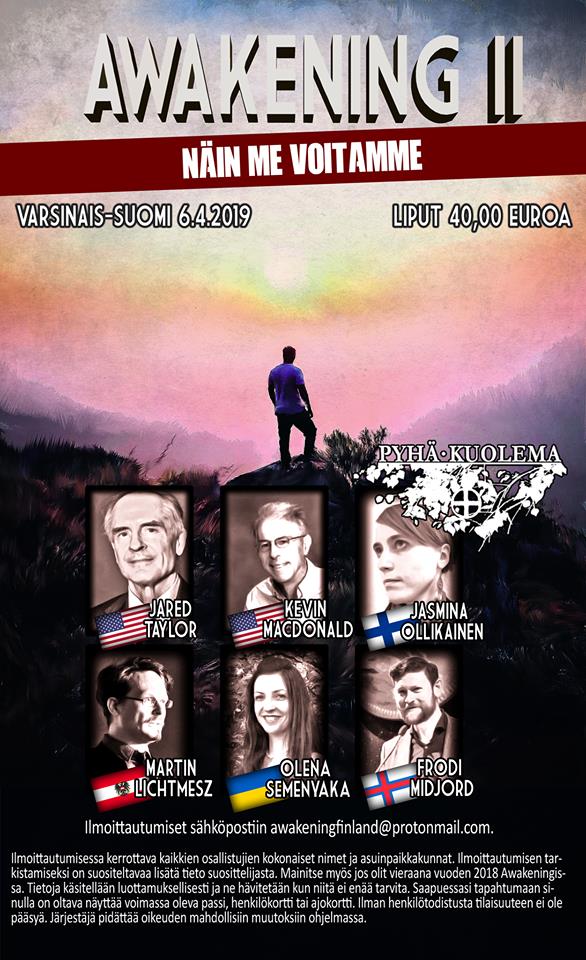
Poster of upcoming Awakening II conference in Finland where Olena Semenyaka of the National Corps is scheduled to appear along with American far-right figures Jared Taylor and Kevin Macdonald
Azov’s public, political agenda puts geopolitical issues front and center. The National Corps political program puts “Ukraine first foreign policy” second on its list of fifteen priorities for Ukraine — right behind national security and war matters, and ahead of Rule of Law (third on the list), Economic Development (fifth), or Improving the population’s health (ninth).
In their own words, Azov leaders have described Russian aggression against Ukraine as an opportunity to further their own global vision. During the Paneuropa Conference held by the National Corps in Kyiv in October 2018, Mykola Kravchenko, deputy leader of National Corps under Andriy Biletsky, reportedly emphasized that the conflict between Ukraine and Russia is not so much a tragedy as a window of opportunity for Ukraine and the whole of Europe and that this unique historical chance should not be wasted by the far-right. These same comments were echoed online by Olena Semenyaka on various occasions.
Central to the National Corps’ “Ukraine First” foreign policy vision are the concepts of Reconquista and Intermarium. The former concept is Azov’s own white supremacist geopolitical initiative, while the latter is an early 20th-century European integration project repurposed by Azov to fit their far-right ideology and goals.
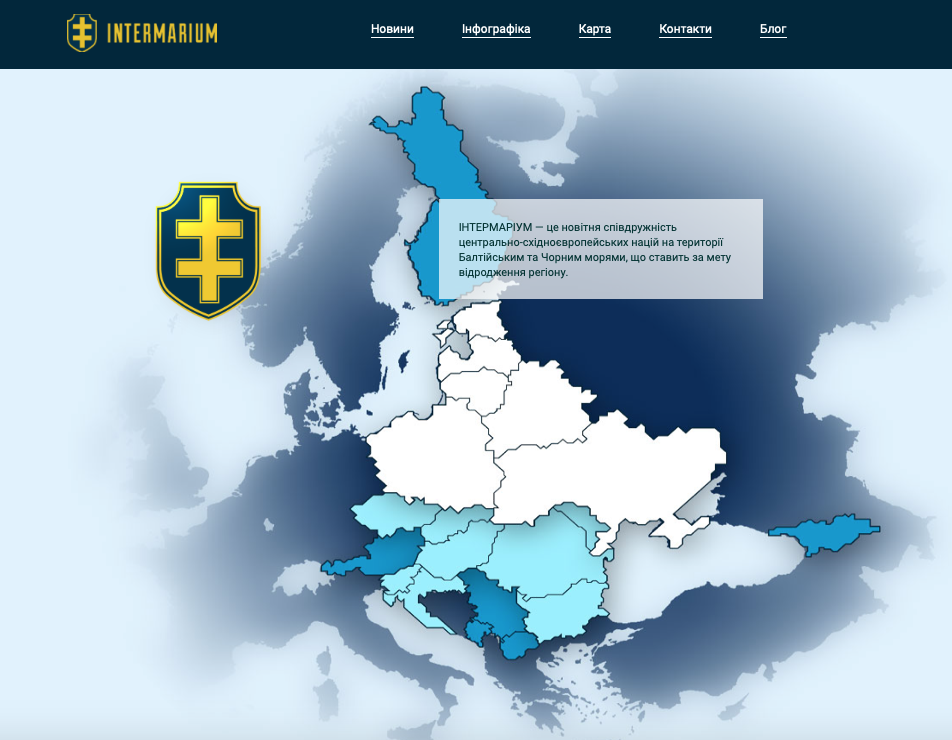
Azov’s geopolitical concept of Intermarium. Screenshot from http://intermariumnc.org
Intermarium (meaning “in-between seas” in Latin) is a project of alternative (as in, an alternative to the EU) integration of European states stretching from the Black to Baltic Seas. As per the National Corps’ program, this anti-EU integration is to be based on the “harmonious combination of traditional values and innovative ideas” and will serve as a springboard towards the development of eventual “new European unity.”
The advance of the Intermarium is seen by Azov as an integral part of the long-term strategy of Reconquista, which is meant to bring together nations of European origin globally under the banner of reclaiming land and culture.
As researchers have noted, the Azov’s National Corps’ has virtually hijacked the concept of Intermarium which was originally created by the Polish interwar statesman Józef Piłsudski and later embraced in regional geopolitical projects such as Visegrad and the Three Seas Initiatives as common security for Central and Eastern Europe.
Azov’s take on Intermarium is something different altogether.
Matthew Kott, a historian, and researcher with Uppsala University, wrote about Azov’s take on Intermarium in May 2017: “The appeal of Intermarium on the far right lies in how it can be portrayed as a political third way. This interpretation takes the ideas of the national conservatives further by positing Intermarium as the remaining heartland of the ‘true Europe’, a bulwark not only against Putinist ‘neo-Bolshevism’ encroaching from Moscow, but also against the neoliberal, multicultural, secular and feminist ‘neo-Bolshevism’ emanating from Brussels.”
By the time that Kott wrote these words, the importance of international expansion for Azov was already on full display. Notably, the founder of the Azov movement, Andriy Biletsky, christened the creation of the Intermarium Support group in July 2016, when the group’s founding conference was held in Kyiv. Biletsky’s deputy in the National Corps, Mykola Kravchenko, is a major proponent of Intermarium and has given multiple presentations of the concept to the party’s members.
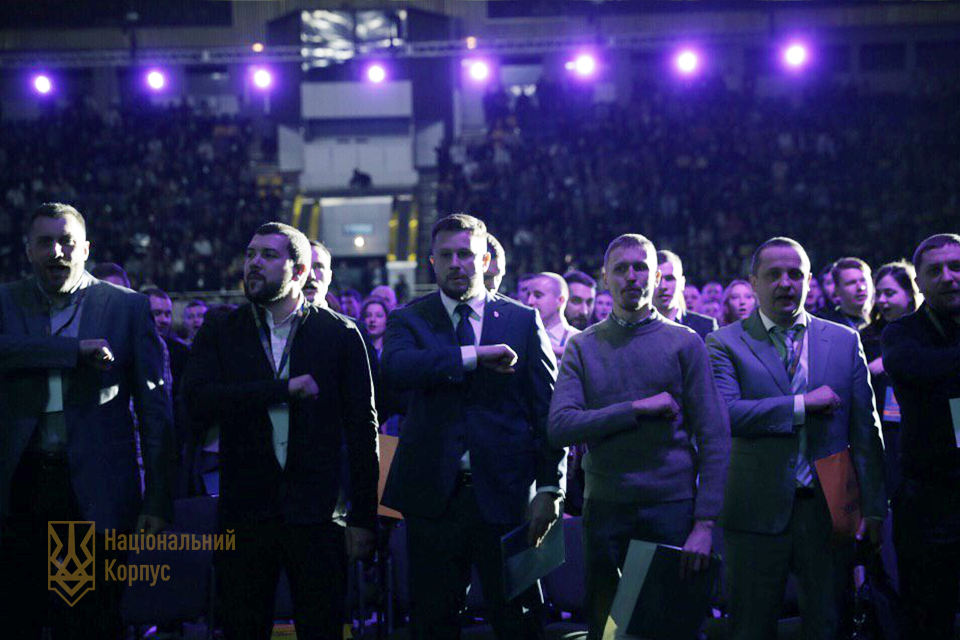
The National Corps Convention in Kyiv’s Sports Palace in January. Andriy Biletsky leader of the party is at the center. Source: https://www.facebook.com/NatCorpsUA
Overall in recent years, the National Corps has held — and delegated the party’s leaders to — a multitude of events in a bid to advance its international vision. As the lead driver of Azov’s international outreach, Olena Semenyaka has crisscrossed Europe joining events in various countries that have inevitably put her in contact with movements, organizations, and individuals from the far-right all across Europe. Europe’s extreme far-right players are also welcome in Ukraine, where they have attended a growing number of events held by the National Corps.
Azov’s allies in Europe include Italy’s neo-fascist Casa Pound, alleged neo-Nazi groups Dritte Weg and JN-NPD from Germany, and others of the same ilk.
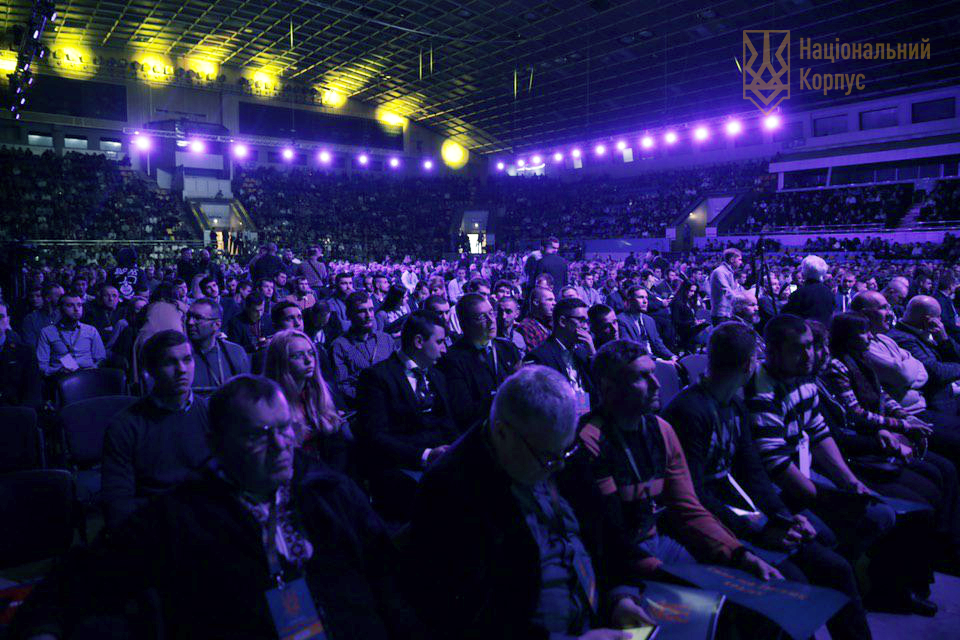
The National Corps Convention in Kyiv’s Sports Palace in January 2019. Source: https://www.facebook.com/NatCorpsUA
Azov’s promotion of the white supremacist Intermarium and Reconquista projects internationally has also connected the Ukrainian group to their American counterparts on multiple occasions, Bellingcat has learned.
In late February 2014, mere days after the Maidan uprising in Ukraine ousted pro-Kremlin president Viktor Yanukovych, the white nationalist American Renaissance site run by the New Century Foundation posted a video reel announcing Ukraine’s far-right global ambitions.
New Century Foundation has been described by the Southern Poverty Law Center as “a self-styled think tank that promotes pseudo-scientific studies and research that purport to show the inferiority of blacks to whites.”
In a two-minute video showing dramatic shots of fighting during Maidan, the leader of Ukraine’s far-right Right Sector group proclaimed: “We are fighting … For a great Ukrainian and European Reconquista… Everything is only beginning! From our Maidan, the rebirth of Kyivan-Rus/Ukraine commences, the rebirth of Europe commences.”
This mention of European Reconquista by the Ukrainian far-right leader fed straight into Azov’s namesake strategy, as the current international advocate of Reconquista in Azov, Olena Semenayka, was with the Right Sector as that group’s International Secretary until early 2015.
In a recent interview, Semenyaka explained that her ideas found a more welcoming environment in the Azov’s National Corps, where according to her “international cooperation was taken to new heights”.
In 2019, Semenyaka is scheduled to attend a number of events where she will speak along with notable far-right figures, including the founder of the New Century Foundation Jared Taylor (a prominent advocate of segregation along racial lines, according to the ADL) and Kevin MacDonald, who was characterized by the Southern Poverty Law Center as “the neo-Nazi movement’s favorite academic” and a proponent of anti-Semitism.
“All White Countries Should Be Doing It”
The National Corps appears to have a particularly strong connection to Greg Johnson, an alt-right ideologue who is currently the editor-in-chief of the white nationalist publishing house Counter-Currents. This publisher has been dubbed as the “epicenter of ‘academic’ white nationalism” by the SPLC. Johnson visited Ukraine in October 2018 and attended events organized by the National Corps, fawned over far-right achievements there, and solicited advice on replicating that perceived success in the United States. On one occasion, Johnson said that the Ukrainian far-right succeeded in putting forth an image of an alternative society.
“I see that you’re actually building an alternative social order here, an alternative society. And that’s what we all need to be doing, in all white countries. We have to have some kind of organizational nucleus that can demonstrate that it can do all the things necessary to secure a society’s future because that will give us the ability to actually take power someday. (…) I think that process is most far along in this country,” Johnson said (00:02:00 into the interview).
Even more remarkable than that alt-right figure’s praise for the National Corps is the role that his site Counter-Currents Publishing has played in broadcasting messages from the Azov movement to readers in the U.S.
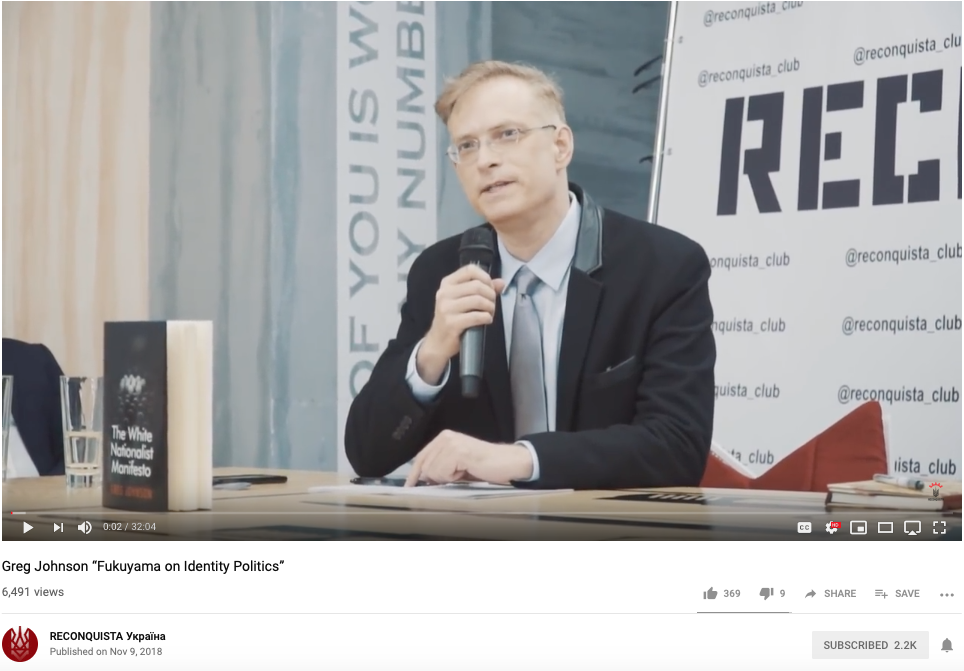
Still from a Youtube video of Greg Johnson’s lecture in Kyiv, at an event organized by the National Corps
The site ran extensive reports from events organized by the National Corps in Kyiv in 2017 and 2018, and in the former case reported statements normalizing violence against immigrants in the West made by Denis Nikitin, an MMA organizer linked to Azov. During the Pact of Steel Conference that took place in Kyiv in 2017, Nikitin, per a Counter-Currents report, provided instruction on countering “violent immigrants who team up to beat defenseless whites, especially in Western Europe.” Said instructions reportedly included advice “to carry weapons of self-defense and not be too law-abiding.”
“Denis has rightly said that we are using the wrong mindset when dealing with our enemies. We think in terms of chivalry and honor, whereas the colored immigrants do not share such ideals. They have no problem with stabbing someone in the back, attacking in larger groups, or beating women. We need to abandon the limiting mindset and fight to win,” the Counter-Currents site reported.
In 2018, Counter-Current also ran a report from Asgardsrei, a “national socialist black metal” festival supported by the Azov as means of the movement’s soft power influence. The event reportedly drew thousands of attendees, including many from the West.
In November 2017, Semenyaka attended the Europe of the Future 2 conference. This event was organized by a Polish white supremacist group and put Semenyaka alongside Aspir Befreier, an American alt-right figure, and self-described anti-semite. Befreier spoke at the event in lieu of prominent white supremacist Richard Spencer.
Although we are not aware of the details of contacts between Semenyaka and Befreier, his speech at the conference highlighted the reasons why American white nationalists look up to their allies in Eastern Europe: “There’s a mantra that the future is Slavic, but truly the present is Slavic. You’re envied for your traditionalism, for the love of your own people.”
He also urged Eastern European nationalists to “demonstrate this new strength.”
“Just as the alt-right was born in the last year or year and a half, Slavic nations are in the spot, so use it,” Befreier emphasized.
All of these instances of the National Corps making contact and cooperating with American extremists leads one to an obvious question: Why does a movement that spends a great deal of time and effort fending off accusations of neo-Nazism continue to publicly cooperate with reported neo-Nazis and white supremacists from the United States?
Conservative Revolution and Grand Plans for the White Race
Bellingcat has discovered statements going back to 2015 by the leading architect of Azov’s geopolitical movement, Olena Semenyaka, that indicate how Azov’s international contacts, including with American white extremists, were predicated on a deliberate embrace of white supremacy by Azov, an ambition to bring forth a “global conservative revolution,” and attempts to co-opt the radical Western far-right.
These statements were made on Azov’s online podcast during two interviews — one in English, and one in Russian — that both expanded on the same topic of Azov’s international strategy. At the time of the interviews, Semenyaka was the head of International Outreach in Azov’s Civic Corps, the direct predecessor to the National Corps political party.
During the Russian-language interview, Semenyaka elaborated on the meaning of Azov’s strategy of so-called International Reconquista and stated that the movement she represented ultimately saw its mission as defense of the white race.
“We are not resigning ourselves to the boundaries of thinking in terms of a single region. We defend not only the Ukrainian nation, national identity, but also the Slavic element, the European element, and in the end — the white race,” Semenyaka proclaimed (00:05:00 into the interview).
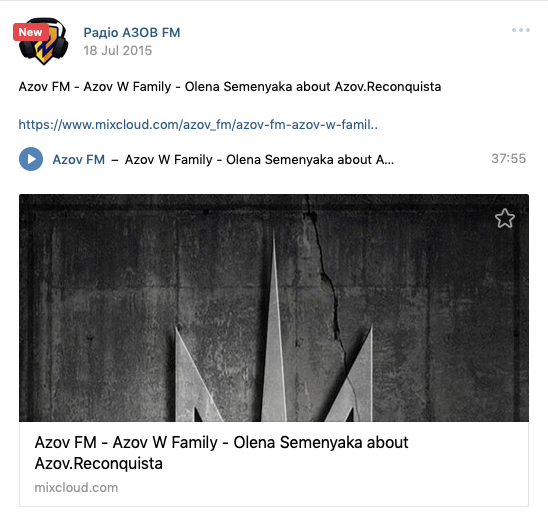
A screenshot of Radio Azov FM announcing an interview with Olena Semenyaka who at the time was the International Secretary of Azov’s Civic Corps
During the interview, Semenyaka clearly established that while Azov’s strategic appetites were a long-term goal, concrete moves to further them were already being taken and that Azov aimed “to create our own Right International.”
“Various conferences, round tables, and joint events [with foreign allies] is the most natural cooperation format that can become a springboard for the International Reconquista,” Semenyaka said (00:42:30 into the interview).
Semenyaka went as far as to liken Azov’s aspirations to that of the Nazi party in interwar Germany: “Our movement is growing, but it’s still too small to compare it to a real movement of the kind Germany had in between wars. But we’re moving towards this goal,” she said.
She also laid out Azov’s vision regarding foreign sympathizers, who were described as those who could be “carriers of these ideas, potential leaders of such cells in their home countries,” and could “spread ideas about the creation of a new geopolitical union, and promote political ideas to the masses”.
Further elaboration on the goals Azov aimed to pursue internationally, and the role foreigners could play, came in an interview Semenyaka gave around the same time in English. Notably, for this particular interview, Semenyaka was hosted by the Azov Regiment’s chief legal counsel, Yevhen Komisar, an aide to Azov founder Andriy Biletsky. Komisar is part of Azov’s lobbying push to have the Rada vote on a law granting a path to citizenship for foreign fighters in Ukraine.
The Liberal West As Enemy
This time, Semenyaka elaborated that the strategy of Reconquista had to do with physical expansion as much as with an ideological challenge to the global status quo.
“It’s also a spatial concept,” Semenyaka said about Reconquista strategy, “It concerns expansion, even geographical. We say that we want to return something, reconquer it. We talk about Eastern Europe. Ukraine is now undergoing a revolution and can become the vanguard of this Reconquista. From this space, it will expand to Western Europe, and then of course the whole world. We can also speak about the World Conservative Revolution” (00:06:50 into the interview).
The liberal West is as much an enemy of Azov’s vision as Putin’s Russia, according to Semenyaka’s 2015 statements.
“Before we tended to counterpose Russia and the West, and tried to find allies in the West. Now we understand that they work hand-in-hand. There are demands to turn Ukraine into an object of international relations and processes (as opposed to an active subject), they come from both the West and the East and we have to combat them”, Semenyaka said (00:13:00 into the interview).
This vision, Semenyaka claimed, was met positively by Western right-wingers: “Reconquista, revolt, conservative revolution is all homological concepts that are quite understandable for European right-wingers. I consider it quite successful.”
Attesting to alleged interest on part of Western right-wingers are statements made in another 2015 interview discovered by Bellingcat. A native English speaker who was introduced by Azov’s podcast host, the aforementioned Yevhen Komisar, as “Sashko from Canada,” laid out his vision regarding cooperation with Western sympathizers. During the interview, Sashko said that prior to joining the Maidan uprising in Ukraine in January 2014 and, eventually, Azov, he had been involved in the European nationalist scene via ZENTROPA identitarian movement, and had been in contact with Ukrainian far-right groups since 2010.
Sashko praised right-wingers from “all types of nationalist movements in Europe” who joined Azov in Ukraine, but emphasized that Western sympathizers could help advance Azov’s agenda in their own countries.
“Online we have guys that translate stuff into different languages. At the moment we have translators for French, Italian, German, Croatian. We have lots of guys translating but we can always use more,” Sashko said (00:24:10 into the interview)
“It doesn’t mean that you must do one thing or another. You just must do something. It can be just talking to some guy in a pub. It can be a lot of things,” he said (00:26:45 into the interview).
Sashko also stated that he believed nationalists should strive for “the real Europe, one outside of the EU, outside the control of the West, and outside of the control of some Mongol Eurasianist block”
“[Reconquista] goes beyond the borders of Ukraine. We need Reconquista of the European soul (…)The European spirit is in a coma. We need to break out of it. We need to awaken the European Spirit. It’s easier said than done, but it begins here!” (00:14:10 into the interview)
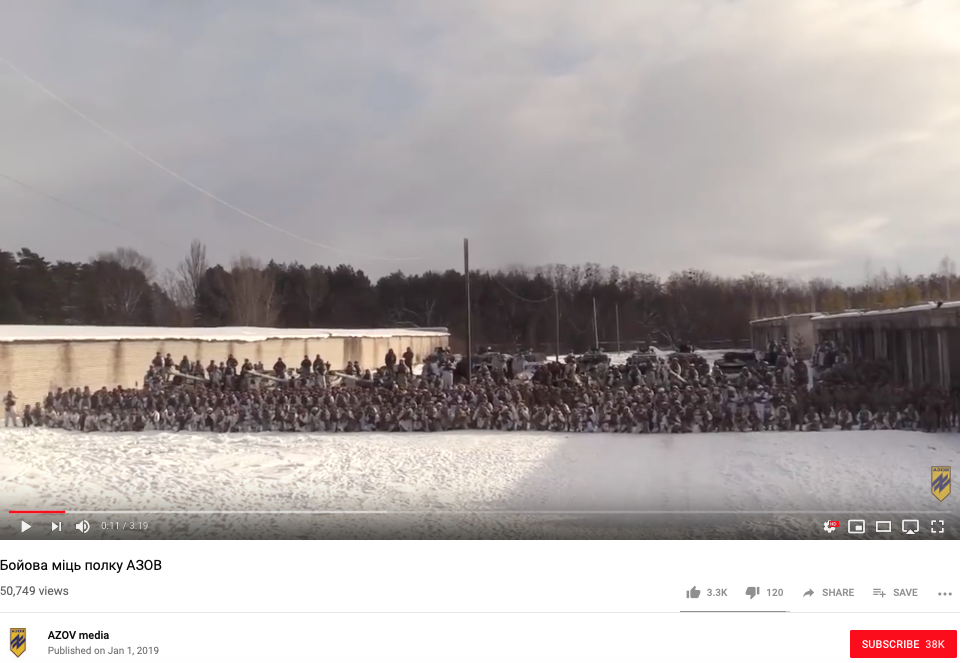
A still from Youtube Video “Military might of the Azov Regiment” published by Azov
Attesting to Azov’s self-identification as a radical movement are statements made at the time by Sergey Korotkih, a prominent leader in the National Corps political party, who was appointed by Ukrainian Minister of Internal Affairs Arsen Avakov to lead his ministry’s Department for the Protection of Strategic Objects in 2015. Prior to this, Korotkih, formerly a citizen of Belarus with reported ties to neo-Nazi organizations in Russia, was granted Ukrainian citizenship by President Petro Poroshenko in 2014
In an interview published by Azov’s online podcast in May 2015, Korotkih fawned over the Islamic State and compared the Azov Regiment to the group.
“I can’t accept ISIS ideology but they’re awesome in what they do. I enjoy their movies very much. I drool over what’s going on in the territories they control”, Korotkih proclaimed during the interview (00:32:45 into the interview), in which he also characterized ISIS as “heroes of that time.”
“Heroes assemble here in Azov too. For the European civilization, Azov fighters are an example of such heroism that harkens back to the Crusades and Middle Ages. Men that come together and leave for the unknown, to a foreign land with only two options: to win something for themselves or to die. That’s the same as ISIS.”
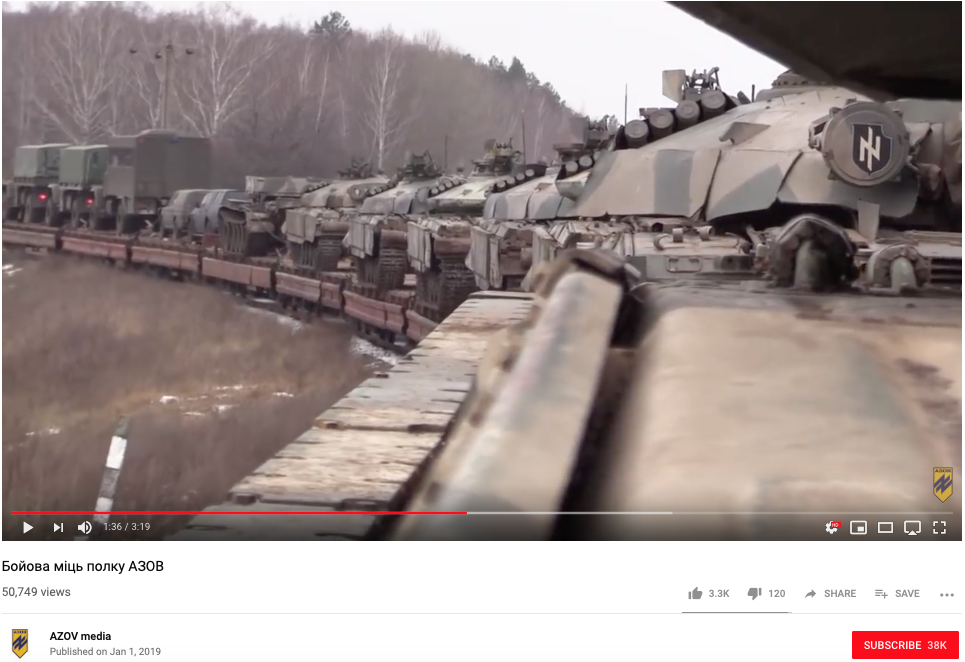
A still from Youtube Video “Military might of the Azov Regiment” published by Azov
According to public records, Korotkih had already been appointed to a government position when he voiced his admiration for ISIS. In the same interview, Korotkih elaborated about bringing foreigners into Azov and stressed that foreign sympathizers could contribute to the movement in non-combatant roles.
“If a particular individual is uniquely skilled [and does not fulfill the criteria set for battlefield roles], he can try out for the Press Service. Azov has a multitude of projects were to fulfill one’s potential.”
These statements by Azov’s leaders and organizers, along with other findings in this report, are especially relevant because Azov has repeatedly dismissed reports tying the movement’s ideology and leaders to neo-Nazism and racism, with these reports labeled as anti-Ukrainian or “Russian propaganda” by many Ukrainian and Western media outlets and institutions.
However, instead of looking at public actions aimed at framing Azov’s work as patriotic, perhaps it is more productive to look at how the movement defines itself when speaking amongst themselves and to far-right and white supremacist groups. This report looks to assess the Azov movement by listening to the Azov movement’s leaders’ public statements, uncovering their attempts to reach out to American far-right extremists, and contextualizing their cooperation with far-right and white supremacist groups in the West.
Azov and the Ukrainian Government: Blurred Lines
The situation with Azov’s outreach to right-wing extremists in the United States is especially worrying considering how the movement has a foothold into some segments of the Ukrainian government, especially the Ministry of Internal Affairs.
The Azov Regiment, the movement’s military arm, is a special operations unit of the National Guard of Ukraine (military unit 3057). In a recent interview, the Regiment’s founder and the National Corps leader Andriy Biletsky claimed that the regiment numbered 1150 fighters: “They’re all volunteers and paid professionals under contract.”
The regiment has its own tanks and other heavy weaponry, and routinely claims to be the most combat-capable unit in the Armed Forces in Ukraine. The regiment is stationed close to the city of Mariupol, on the Azov Sea, and reportedly played a key role in the liberation of Mariupol from Russian and Russia-backed forces in 2014.
The Azov Regiment’s current umbrella government body, the National Guard, is a militarized branch of Ukrainian law enforcement within the Ministry of Internal Affairs, led by Arsen Avakov.
In May 2014, the ministry signed off on the integration of reported far-right figures and militants into Ukraine’s government under the banner of Azov, which was first the Azov Battalion governed by the Ministry of Internal Affairs. In 2014 the Azov Regiment’s first commander Andriy Biletsky credited Avakov with supporting the launch of Azov, and minister Avakov admitted himself in a 2016 interview that he was directly involved in the creation of Azov in 2014.
On Avakov’s order, Azov, already a regiment, was integrated into the National Guard in October of 2014, a move that enabled the far-right group to gain access to sophisticated weaponry and training, including access to American-made rocket-propelled grenade launchers. Avakov has praised Azov as “one of Ukraine’s most combat-capable units.”
According to Anton Shekhovtsov, researcher of European far-right movements, Avakov, who hails from Ukraine’s highly politically competitive Kharkiv region, could have a history of dealings with reported neo-Nazis from Azov’s predecessor organization, Patriot of Ukraine, led by Biletsky before the Maidan. Shekhovtsov wrote in late 2014 that Biletsky’s involvement with the Ukrainian police seemed to be driven by Avakov’s “trust in the organization that he worked with in the past.”
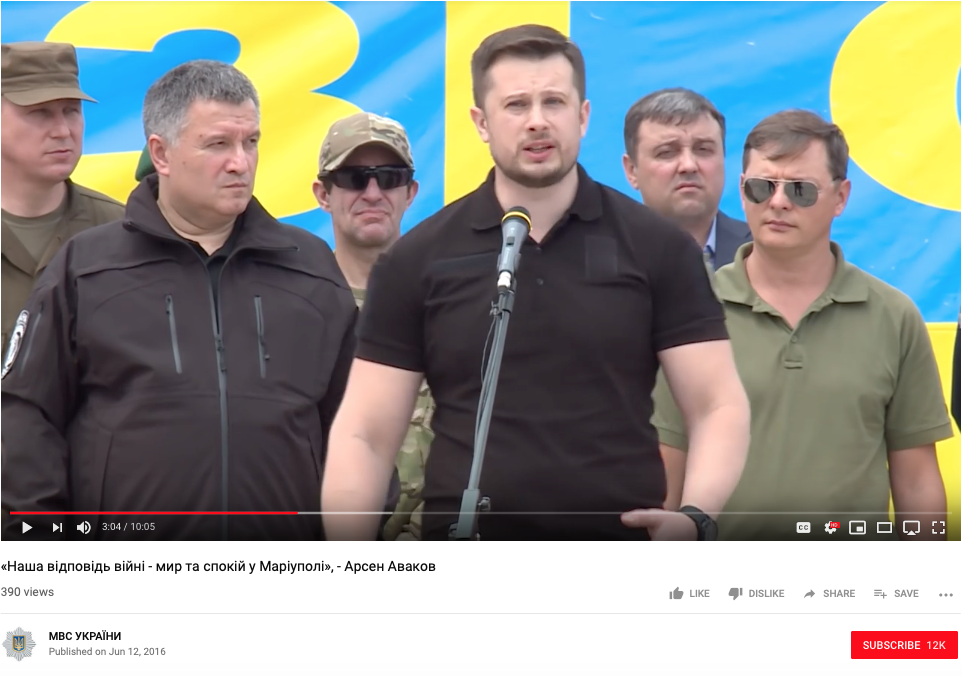
A Youtube still from video posted by the Ministry of Internal Affairs of Ukraine. Andriy Biletsky is speaking with Minister Avakov, who is second from the left, next to him during the celebration of the liberation of Mariupol
“Avakov also seems to believe in the personal loyalty of the Patriot of Ukraine-led Azov battalion and may use them as his ‘private army’ for business or political reasons,” Shekhovtsov wrote.
Azov’s leader Biletsky admitted in a recent interview, that he has regular meetings with Avakov (“2-3 meeting a year”), but claimed their relationship started in 2014. In another recent interview, Biletsky specified that his communication with Avakov is limited to matters related to the Azov Regiment, and expressed regret that Azov was part of the Ministry of Internal Affairs.
Biletsky also dismissed allegations of Avakov’s current influence on Azov’s National Corps political party as “a fiction pushed by the Presidential Administration of Ukraine,” and insisted that his party was an independent subject in Ukrainian politics.
Minister Avakov has condemned neo-Nazism and anti-Semitism on a number of occasions. In July 2018, in the wake of a lethal attack on Ukrainian Roma in Lviv, Avakov suggested to G-7 ambassadors and diplomats in Kyiv “to pressure young neo-Nazis by imposing additional limitations on entry to EU states.” Avakov also criticized Azov’s street branch, the National Militia.
It should also be noted that Arsen Avakov reportedly has a tense competitive relationship with Ukraine’s President Petro Poroshenko, and allegedly may be backing one of Poroshenko’s competitors in the upcoming Presidential election in Ukraine.
While there are claims that the Azov Regiment, as part of the National Guard, is not influenced by the National Corps, such claims do not hold water. Andriy Biletsky, head of the National Corps and a strong Poroshenko critic, regularly visits the National Guard’s Azov Regiment base near Mariupol to address the troops, and is unequivocally greeted there as their leader. This relationship can be seen clearly with Biletsky’s New Year’s video address, where he was surrounded by apparent active duty members of the Azov Regiment, wearing their respective patches.
“I’m wishing Ukraine dedication and strength to get rid of the parasites that feed on it, regardless of what their names are,” Biletsky said, apparently equaling Ukraine’s elite to the Russia-led forces occupying the country’s east.
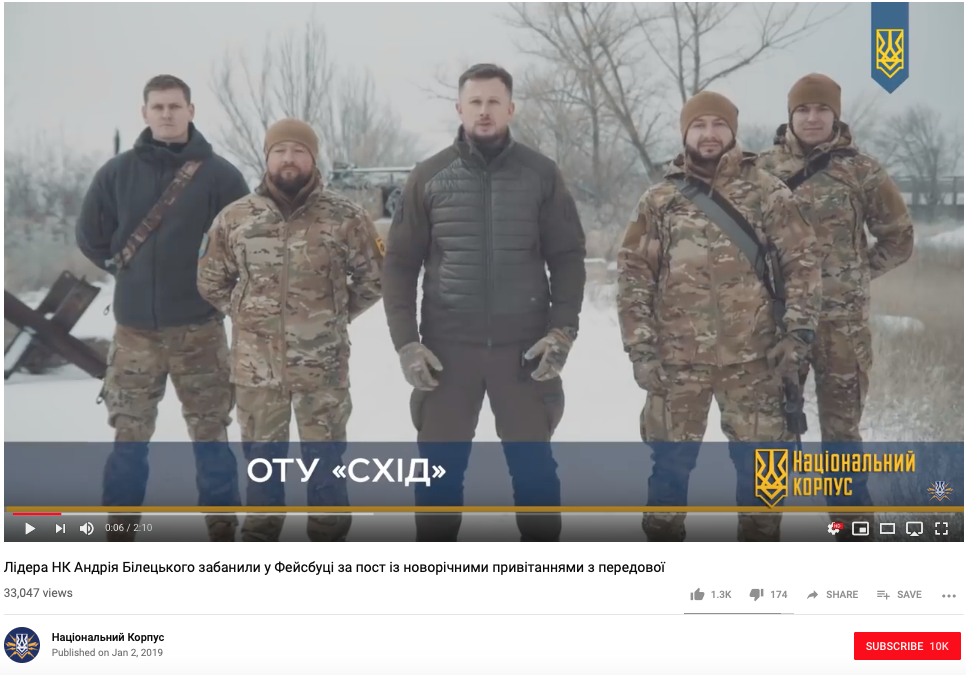
A Youtube still from Andriy Biletsky’s New Year’s address
During Biletsky’s visit to the National Guard’s Azov Regiment base on New Year’s Eve, he also presented his vision for the future to Azov fighters: “2019 will be incredibly important for us. I’m hoping that it will become the year of Azov’s and thus Ukraine’s victories,” Biletsky said during the event.
In a report about the event, as well as on numerous other occasions, the regiment’s own site unequivocally characterized Biletsky as “the leader of the Azov Movement.”
Recognition of Biletsky as the leader of the National Guard’s Azov Regiment was echoed in February 2019 by the Regiment’s chief of staff Svyatoslav Palamar in a video interview. “We have a leader in Andriy Biletsky, who’s currently an independent member of parliament of Ukraine,” he said.
According to Palamar, Biletsky takes care of raising financial support for the Regiment, and “finds sponsors that invest money” in Azov enabling the Regiment to have quality equipment, access to proving grounds, etc.
Azov’s incorporation into the National Guard has raised eyebrows within that militarized branch of Ukraine’s law enforcement, as well as in the United States. A 2017 interview of the current head of the National Guard of Ukraine, General Yuriy Allerov, pointed to both his concerns about the regiment and its role in ensuring security in Ukraine’s strategically important Mariupol region.
“As much as it’s possible we attempt to get rid of their pagan gestures and rituals that stand out so much… But we don’t bend them across the knee, because unfortunately, there is no other comparable motivated resistance movement like that in the east of Ukraine,” Allerov said of Azov in a 2017 interview. Far from a new face in the newly strengthened Ukrainian Armed Forces, Allerov is a 54-year-old, career military official who reportedly started his career in the Soviet Union.
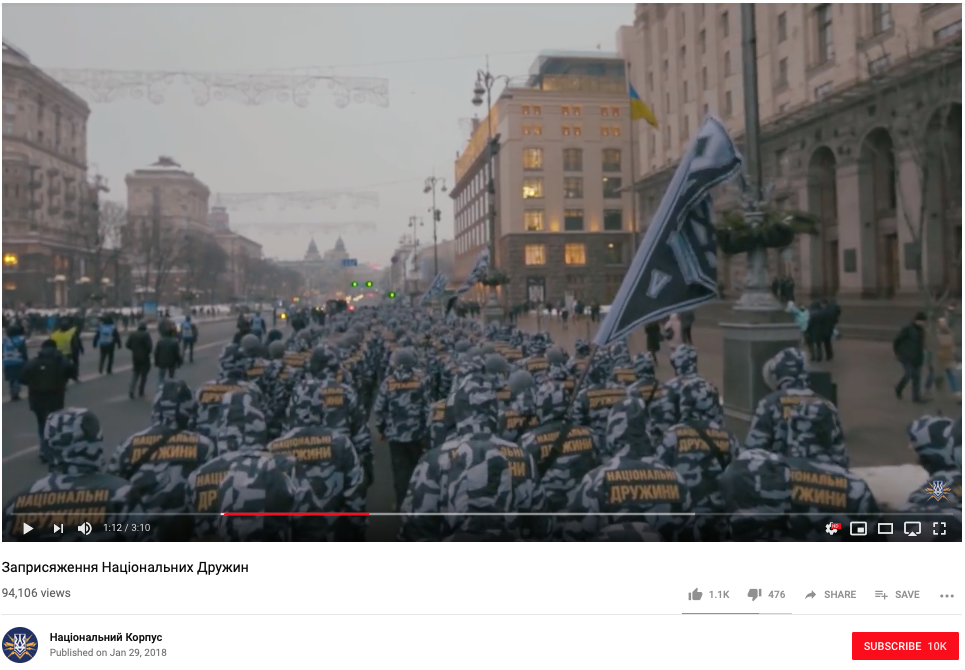
A Youtube still of the Swearing in of Azov’s street wing the National Militia in Kyiv in January 2018. The organization is led by Ihor “Cherkas” Mykhailenko who is a former commander of the National Guard’s Azov Regiment
Allerov’s unease about Azov’s “gestures and rituals” and other specifics partially echoes concerns from U.S. Representative Ro Khanna, the congressman behind the 2018 Congressional ban (see Section 8129 of the Consolidated Appropriations Act, 2018) on the use of U.S. budget funds “to provide arms, training, or other assistance to the Azov Battalion.”
“Rather than disband Azov, the government incorporated it into the Ukrainian National Guard, overseen by the Ministry of the Interior,” Khanna said about this military organization in April 2018. A month later, he claimed that the “battalion has very much engaged in incidents of neo-Nazism.”
Khanna’s statement also reflected his apparent understanding that Azov’s rise has been aided by infighting within Ukraine’s elite, specifically centered around Minister of Internal Affairs Avakov, and is not necessarily centrally approved by Ukrainian President Petro Poroshenko.
“[Ukrainian President Petro] Poroshenko himself doesn’t have Nazi sentiments — his government has provided aid to the Azov Battalion,” Khanna’s May 2018 statement read.
The Azov movement’s special relationship with Ukraine’s Ministry of Internal Affairs has allowed it to develop what is essentially a revolving door environment where the movement’s loyal members migrate between government bodies, the Azov political party, and it’s street movement, along with providing support to Azov’s projects while holding government positions.
The movement of Azov leaders between its different bodies, and the National Guard, can be seen with the Azov Regiment’s three military commanders. Biletsky, the leader of the National Corps (Azov’s political wing), was the Azov Regiment’s first military commander. The current head of Azov’s National Militia is Ihor “Cherkas” Mykhailenko, who previously succeeded Biletsky as the Azov Regiment’s second commander. The National Corps’ operations in eastern Ukraine are currently led by Maksym Zhorin, who was the Regiment’s third military commander after Cherkas.
A prominent current leader of the National Corps and Azov Regiment alumnus Sergey Korotkih (who made public statements about ISIS) was appointed by Avakov to lead the Ministry of Internal Affairs Department for the Protection of Strategic Objects in May 2015, a position he apparently held until November 2017 when he was replaced by another Azov Regiment alumnus, Serhiy “Khorst” Korovin.
Korotkih is currently a key figure in the Azov movement and a reported associate of Avakov. In a recent video interview, Korotkih admitted he is a national socialist and supports a pan-European, white nationalist, anti-Muslim agenda. During the interview, Korotkih confirmed he met Avakov and stated he’s friends with the son of the Minister of Internal Affairs of Ukraine, Oleksandr Avakov.
Azov and Ukraine’s Top Law Enforcement Officials
It is worth highlighting that Azov Regiment alumni with self-described extremist far-right backgrounds are currently found at the top of the Avakov-led Ministry of Internal Affairs.
One such individual is Serhiy Bondarenko, deputy head of the Kyiv region police. Bondarenko is a combat veteran of the Azov Regiment and was appointed to his senior-level position in Ukraine’s Ministry of Internal Affairs in 2014. According to his electronic asset declaration (mandatory for Ukrainian public officials) submitted in early 2018, Bondarenko is still a law enforcement official in Ukraine.
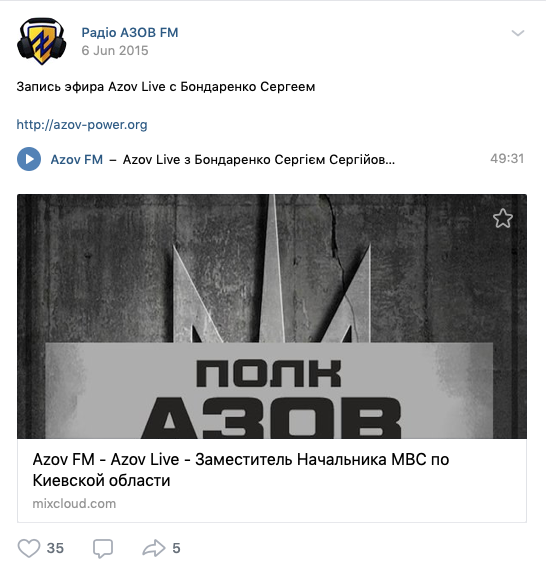
A screenshot of “Radio Azov FM” announcing an interview with a Ukrainian law-enforcement official and Azov’s loyalist, Serhiy Bondarenko, deputy head of the Kyiv region police
In 2015 statements to Azov’s podcast, Bondarenko stated he was part of Ukraine’s far-right scene since 2009 (“I took part in some activities” he said about his past as a far-right activist pre-Azov), and noted that the incorporation of Azov’s members into the government has not altered their ideology, which he described as “permanent.”
“I’m confident that all members of the Azov movement have permanent ideological views that won’t change”
During the interview, Bondarenko stated that the incorporation of Azov into Ukraine’s government contributed directly to that far-right movement’s ability to build its own political power, and granted the group access to heavy weaponry.
“The Regiment has grown stronger, and can now, because of its legitimization, influence civic processes via our Civic Corps branch [predecessor of the National Corps political party], as well as perform better on the frontlines,” Bondarenko said. “[With the incorporation] the regiment has received weapons that it would never get as an illegal formation” (00:02:30 into the interview).
In answering the host’s questions, Bondarenko also gave examples of members of the Azov movement in leadership positions inside the Ministry of Internal Affairs.
“Those are fighters that graduated from the Azov Regiment and stayed in the ranks of the Ministry,” Bondarenko stated (00:04:10 into the interview), adding that there were Azov alumni employed as law enforcement officials in the Kyiv, Kharkiv, and Poltava regions.
Also listed as a member of the Azov movement by Bondarenko was his direct senior at the time, Vadym Troyan, who is currently a deputy minister of Internal Affairs of Ukraine following a 2014 appointment from Avakov as head of the Kyiv regional police. Although Troyan’s appointment in 2014 caused a stir in Ukraine and was reported in international media, he has risen through the ranks of the Ministry of Internal Affairs without drawing attention internationally.
The designation of Troyan as loyal to Azov by Bondarenko lends credence to reports about the influential deputy minister’s ties to Azov. Troyan is both an alumnus of the Azov Regiment and a veteran far-right operative in Ukraine, whose personal involvement in the far-right scene can be seen as illustrative of the Ukrainian far-right’s generally rising influence.
According to Vyacheslav Likhachev, Kyiv-based expert on right-wing groups in Ukraine and Russia, in the second half of the first decade of the 2000s Troyan held a leadership position in Patriot of Ukraine, a Biletskiy-led far-right organization that was a predecessor to the Azov regiment and movement. Likhachev characterized the Patriot of Ukraine as a neo-Nazi organization.
While with Patriot of Ukraine, Troyan was reportedly personally involved in a high-profile public incident of neo-Nazism. According to a contemporaneous report, in 2008 Troyan was arrested and appeared before the court after an ultra-nationalist rally in Kyiv that quickly turned violent. According to a photographic report from the event, participants gave Nazi salutes and clashed with the law enforcement. During the rally, Troyan reportedly led a group of men from Patriot of Ukraine. At the time, the rally was dismissed as a provocation against pro-Western President Yushchenko.
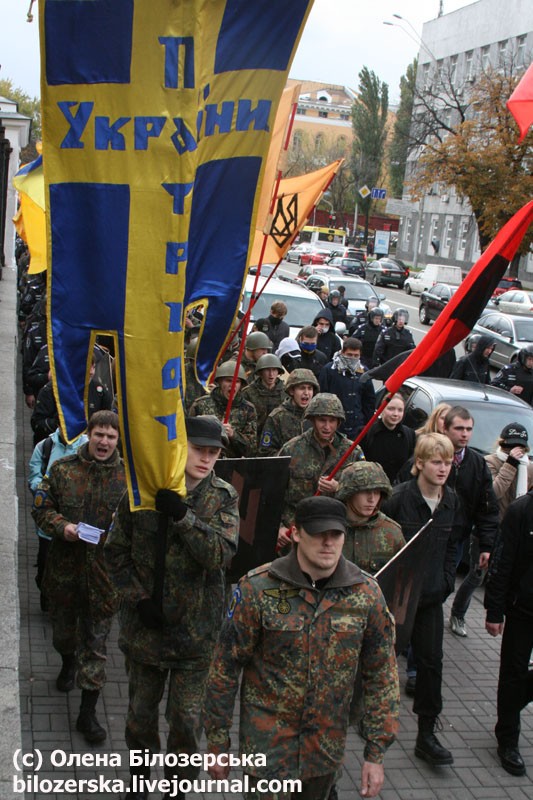
Vadym Troyan, center, leading a column of reportedly neo-Nazi organization Patriot of Ukraine in 2008
Fast forward to a post-Maidan Ukraine where, now as a deputy minister, Troyan has provided backing to Azov’s recent controversial projects.
In July 2017, it was deputy minister Troyan who, according to the National Corps site, christened the launch of the Azov movement’s “patriotic center” for youth and children that has made international headlines as “Ukraine’s far-right children’s camp.”
Previously, in 2015, Troyan vocally recommended an earlier iteration of Azov’s controversial camp for kids on his Facebook profile. Also in July 2015, Troyan apparently endorsed Azov’s Civic Corps leadership seminar “School of the Natiocracy” that included “ideological training” and “political education” on Facebook.
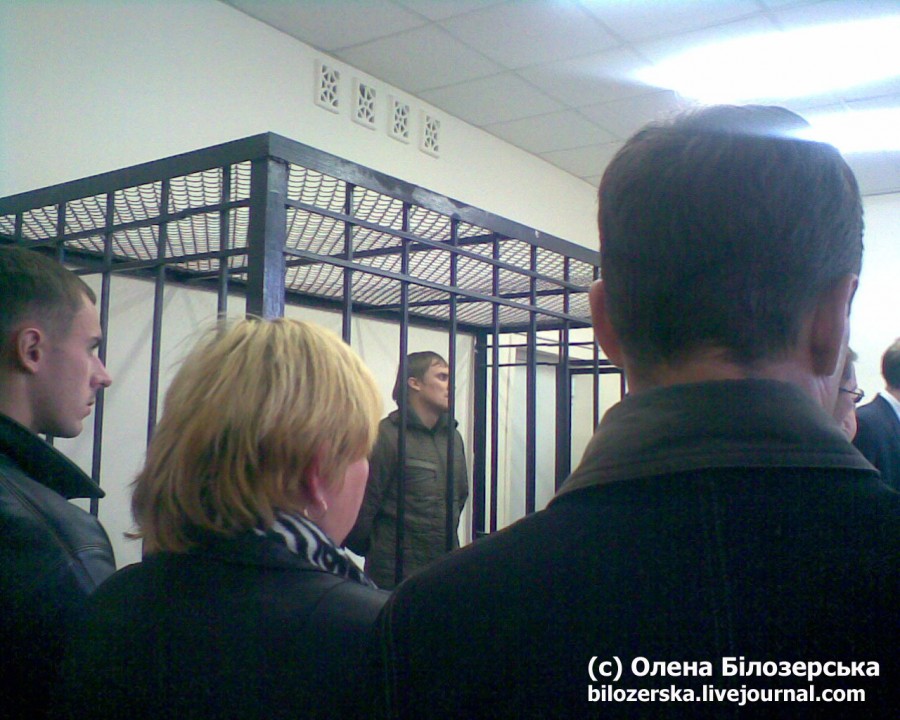
Vadym Troyan, center, in court after being reportedly arrested at nationalist rally in Kyiv in 2008
On his Facebook profile, Troyan also posted photos and videos of himself wearing the Azov Regiment patch on what appears to be official occasions, congratulated the Regiment on important anniversaries, tagged those he apparently served in Azov with, including individuals implicated in acts of violence that his Ministry of Internal Affairs is tasked with countering. On one occasion Troyan congratulated a veteran of Azov who was joining Ukrainian law enforcement.
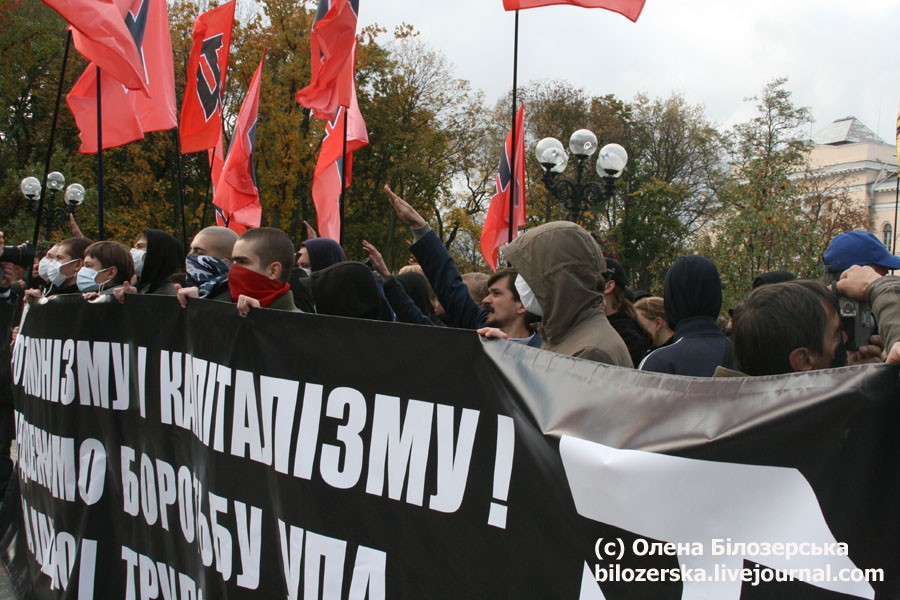
Nazi salutes at the 2008 nationalist rally in Kyiv where Troyan, now deputy-minister of Internal Affairs of Ukraine, was reportedly arrested
Azov’s delegates to the Avakov-controlled ministry also allegedly enjoy Avakov’s protection.
In 2017, Troyan was implicated by Ukraine’s Prosecutor General’s Office in the alleged extortion of a Ukrainian businessman. This incident involved Troyan’s deputy and a leader of Azov’s Civic Corps.
According to a report in one of Ukraine’s largest and most respected investigative outlets, Ukrainska Pravda, Avakov immediately rushed to diffuse the situation and engaged top officials of the Ukrainian government in doing so. The case later reportedly collapsed.
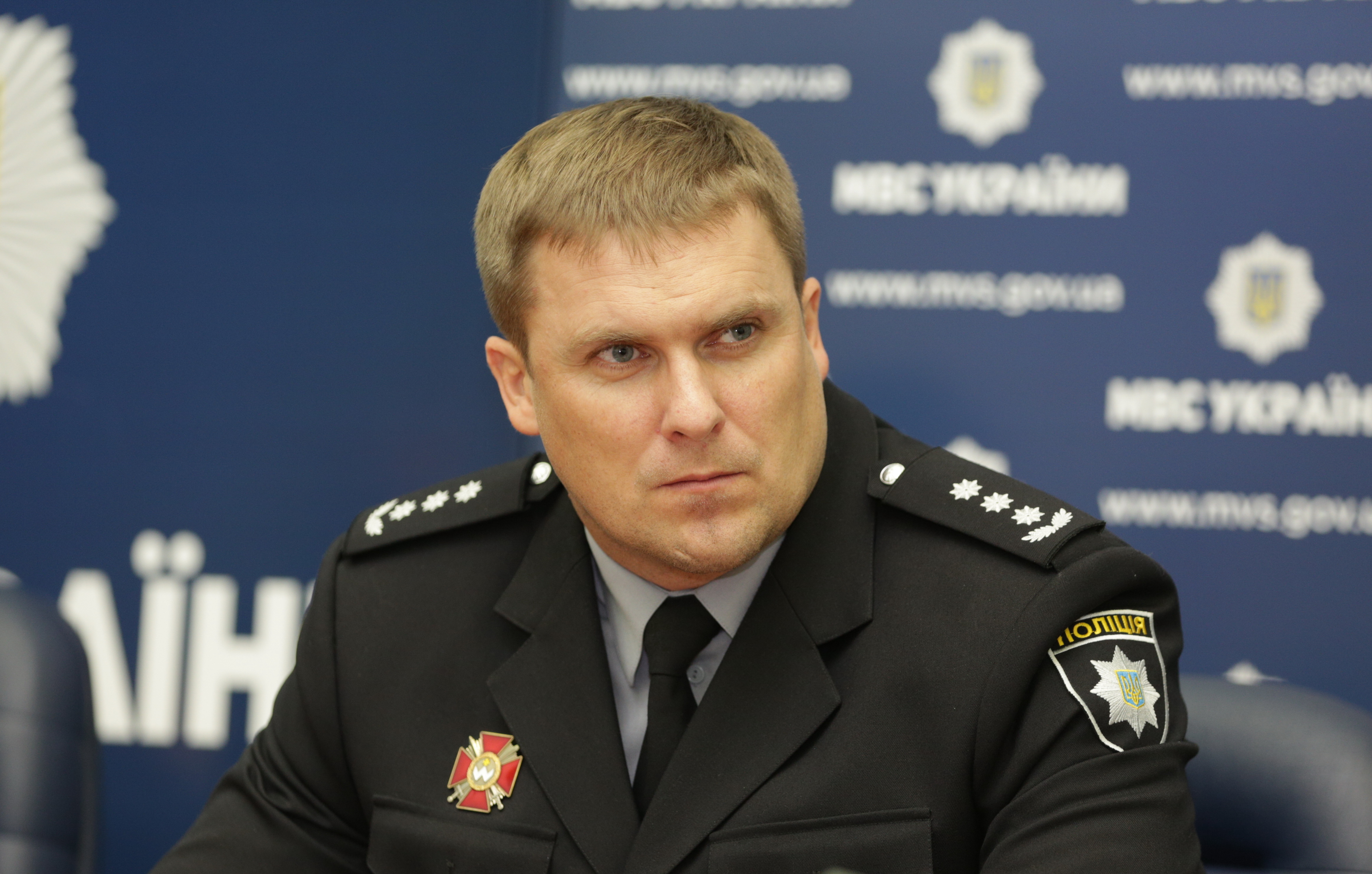
Vadym Troyan, top Ukrainian law enforcement official. Source: http://mvs.gov.ua
Far-right extremists may enjoy a certain level of impunity in Ukraine. In June 2018, a joint address from human rights organizations Human Right Watch, Amnesty International, Freedom House, and Frontline Defenders called on Avakov to end impunity for acts of radical violence in the country. Members of Azov’s National Corps, along with the National Militia, were reportedly involved in attacks on LGBT people, human rights activists, and minorities in Ukraine.
Azov’s relationship with Avakov’s Ministry of Internal Affairs of Ukraine, along with Azov’s antagonistic relationship with the government of Ukraine, provide a glimpse into its domestic influence in conjunction with the movement’s international ambitions through its contacts with Western and American far-right individuals and groups.
Radio Free Europe / Radio Liberty (RFE/RL) correspondent Christopher Miller contributed research to this report
Source: Bellingcat.com
ATTENTION READERS
We See The World From All Sides and Want YOU To Be Fully InformedIn fact, intentional disinformation is a disgraceful scourge in media today. So to assuage any possible errant incorrect information posted herein, we strongly encourage you to seek corroboration from other non-VT sources before forming an educated opinion.
About VT - Policies & Disclosures - Comment Policy

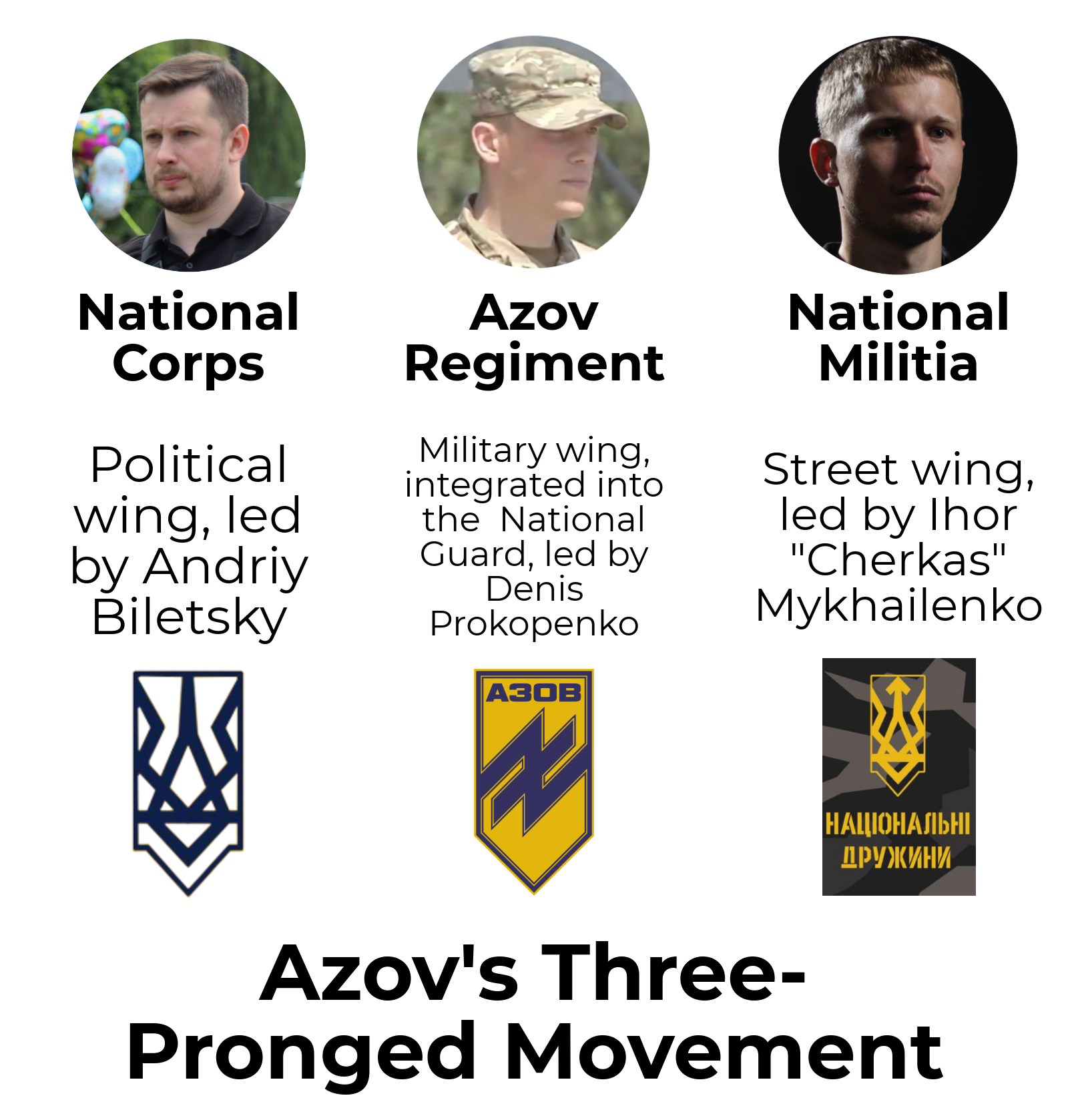



Once these US Nazis complete their training in Ukraine, those that survive will return to the USA with real combat experience and all all the dumb down ones who jumping through hoops to “stand with Ukraine” will have to deal with them.
The fake media hopefully will hopefully get a taste of American Nazis patriotism. I do hope Sean Penn will be around for Nazi government. By the way Sean Penn is demanding his hero Zelensky take part in the 2022 Oscars. I wonder where was his outrage when we invaded Panama, Grenada, Iraq, Syria, and Afghanistan. I do believe his demand will be met as most Americans finally found a conscience against war.
My only question is why is the US supporting this trash.
But, they will get hugs from Uncle Joe. He likes to hug and grope. These Ukes can become his personal bodyguards when he is booted out of White House. At the taxpayer’s expense. Well, there goes my breakfast just thinking about it.
Will that sounds about right Amerika trains ukraine Nazi so the can train Amerikan Nazi so now that war is lost we bring them home to the New Amerika:-(
Comments are closed.